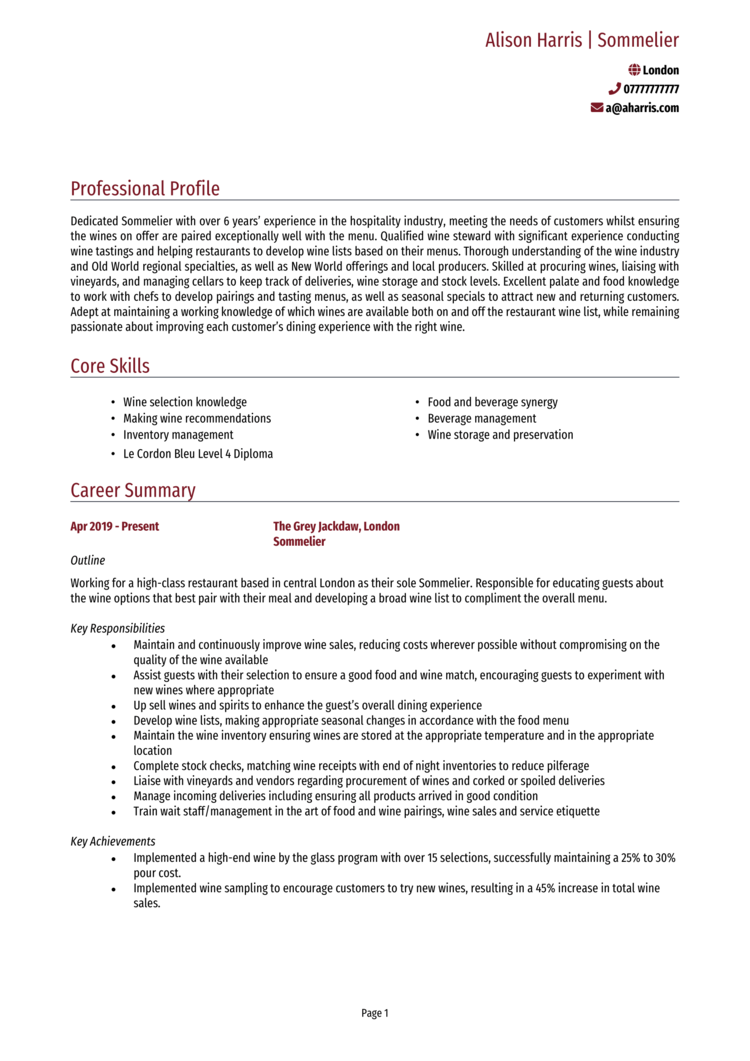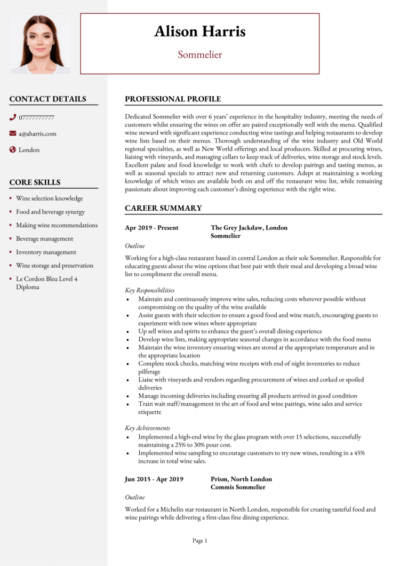You know the difference between a wine that simply fills a glass and one that completes an entire dining experience. A Sommelier’s CV should have the same finesse – presenting your palate and service expertise in a way that’s easy for recruiters to savour.
Alongside a Sommelier CV example, this guide will show you how to best showcase your credentials and experience to convince hiring managers of the value you’ll bring to any hospitality setting.
Sommelier CV sample

How to write your Sommelier CV
Discover how to craft a winning Sommelier CV that lands interviews with this simple step-by-step guide.
A sommelier’s work blends technical knowledge with artistry, and your CV needs to capture both. A well-prepared document can be the difference between being overlooked and being invited in for a conversation about how you could elevate an establishment’s wine service.
Below, you’ll find practical advice on presenting your expertise clearly, structuring and writing a CV effectively, and tailoring your experience to match the expectations of high-end establishments.
How to structure and format your Sommelier CV


The perfect wine list is curated with care – and so should your CV be. A logical, well-organised structure makes it easy for employers to see the depth of your experience and understand your strengths, and will let them picture you working within their team. Avoidable mistakes will get even the most qualified candidates totally overlooked.
Here’s the layout to follow:
- Name and contact details – Keep these contact details at the top so a potential employer can reach out to you.
- Profile – Immediately draw in the recruiter with a brief summary of your skills and experience.
- Core skills – State your best qualities at a quick glance.
- Work experience – Walk through your employment history in reverse chronological order.
- Education – List the qualifications and certificates that make you the right fit.
- Additional info – You can optionally list any relevant hobbies and interests which help to convey your fit for the role.
When formatting, keep your CV polished and inviting. Use bullet points to simplify blocks of text, break the document into clearly labelled sections, and choose a clean, legible font. Keep the document length to no more than two pages, and make good use of white space so your most impressive details have room to breathe.
How to write a Sommelier CV profile


Your CV profile is where you convey the value you’d bring to any venue. In just a few lines, you should communicate your wine knowledge and customer service skills, giving recruiters an insight into your ability to enhance the guest experience while driving revenue.
Think of it as your first opportunity to prove that you understand both the art and the business of wine: your ultimate aim is to convince people to read further.
Sommelier CV profile examples
Profile 1
Experienced Sommelier with over 15 years in Michelin-starred restaurants and luxury hotels, curating extensive wine lists and leading staff training programmes. Skilled in sourcing rare vintages, managing supplier relationships, and delivering exceptional tableside service. Proficient in cellar management software and inventory control systems. Recognised for pairing expertise that enhances guest experiences and supports strong revenue growth through upselling and premium selections.
Profile 2
Knowledgeable Sommelier with eight years of experience in high-end restaurants and wine bars, specialising in European and New World wines. Adept at creating balanced wine lists, conducting tastings, and advising guests with clarity and enthusiasm. Experienced in managing supplier negotiations, cost control, and seasonal menu pairings. Known for excellent communication skills and the ability to engage both novice and expert wine drinkers.
Profile 3
Passionate Sommelier with three years of experience in boutique hotels and fine dining establishments. Assisted in wine list development, coordinated wine service, and hosted tasting events for guests. Comfortable using cellar management systems and POS software to track inventory. Dedicated to continuous professional development with WSET Level 3 certification in progress.
Details to put in your Sommelier CV profile
Here are some tips on what you should include:
- Where you worked – Describe the types of venues you’ve worked in, from fine-dining restaurants to boutique wine bars or luxury hotels.
- Your top qualifications – Mention relevant wine education, certifications, or hospitality training that validates your expertise.
- Essential skills – Highlight key competencies in a way that reflects the needs of the role, ensuring they’re relevant and measurable.
- Specialist areas or focus – Indicate areas of deep knowledge, such as specific wine regions, pairing expertise, or cellar management.
- Value delivered – Explain how your work has improved customer satisfaction, influenced purchasing decisions, or contributed to revenue growth.
What to include in the core skills section of your CV


This section provides an at-a-glance view of your professional capabilities – something recruiters appreciate when scanning applications.
Focus on tangible, role-specific abilities that can be linked to your experience. Tailor your CV skills to the specific role and employer, ensuring they align closely with the qualities outlined in the job description. This makes it immediately clear that you can meet their exact requirements.
What are the most important skills for a Sommelier CV?
- Wine and Beverage Pairing Expertise – Recommending wines that complement specific dishes, enhancing the overall dining experience.
- Wine List Curation and Management – Developing and maintaining a balanced, diverse wine menu that aligns with the restaurant’s cuisine and clientele.
- Cellar Organisation and Inventory Control – Managing stock levels, proper storage conditions, and rotation of wine inventory to preserve quality.
- Tasting and Quality Evaluation – Assessing wines for aroma, flavour, and structure to ensure optimal selection and service.
- Wine Service and Presentation – Serving wine with precision and professionalism, including decanting, glass selection, and temperature control.
- Staff Training and Education – Teaching service teams about wine regions, varietals, and pairings to support informed recommendations.
- Customer Engagement and Upselling – Guiding guests through the wine list and encouraging exploration of higher-tier selections.
- Knowledge of Wine Regions and Trends – Staying updated on global wine trends, vintages, and emerging producers to keep the offering current.
- Supplier and Distributor Relations – Working with vendors to source quality wines and negotiate pricing and delivery terms.
- Event and Tasting Coordination – Organising wine dinners, tastings, and promotional events to enhance guest experience and revenue.
How to write a strong work experience section for your CV


For a sommelier, work experience is as important as knowledge. Your work history should reflect how you’ve applied your expertise to create memorable guest experiences, improve wine programs, and support the broader goals of the establishment.
List your roles in reverse chronological order, starting with the most recent. For each, provide a concise summary before using bullet points to outline your main duties and notable achievements. This structure keeps the section readable and highlights the impact of your work.
The best way to structure job entries on your CV

- Outline – Introduce the venue, your role, and the main objectives of your position, noting who you reported to and the type of clientele you served.
- Responsibilities – Detail your core duties, using action words like “curated” and “trained.” For example: “curated seasonal wine lists” or “trained front-of-house staff in wine service.”
- Achievements – Share measurable results, such as increased wine sales, improved guest ratings, or successful events you’ve overseen.
Sample jobs for Sommeliers
Sommelier | La Fontaine Fine Dining
Outline
Managed the wine programme for a Michelin-starred restaurant, curating an extensive wine list featuring both Old and New World selections. Delivered exceptional wine service to guests while supporting staff training and development.
Responsibilities
- Created and updated a 600+ bottle wine list aligned with seasonal menus
- Trained front-of-house staff on wine knowledge, service, and upselling techniques
- Maintained supplier relationships and negotiated pricing agreements
- Oversaw wine cellar organisation and stock rotation using inventory systems
- Delivered tailored wine pairings and recommendations for guests at table
Achievements
- Increased wine sales revenue by 25% within the first year through upselling initiatives
- Secured exclusive allocations of rare vintages from French and Italian producers
- Received industry recognition with a Wine Spectator Award of Excellence
Sommelier | Harrington Wine Rooms
Outline
Oversaw wine service and guest engagement at a high-end wine bar and restaurant specialising in European wines. Balanced guest education with profitability by maintaining an appealing and accessible wine list.
Responsibilities
- Advised guests on wine choices based on personal taste and menu pairing
- Organised weekly themed tastings and wine education events
- Maintained inventory records and ensured accurate stock counts
- Collaborated with chefs to design pairings for seasonal tasting menus
- Negotiated supplier contracts to expand selection within set budgets
Achievements
- Boosted guest return rate by 20% through popular tasting events
- Expanded wine sales margins by 15% through effective supplier negotiations
- Developed a streamlined stock control process that reduced wastage by 30%
Sommelier | The Rosewood Boutique Hotel
Outline
Provided wine service and cellar management at a luxury boutique hotel with an emphasis on enhancing the guest dining experience. Supported the development of a curated, mid-sized wine list designed to complement international cuisine.
Responsibilities
- Maintained a 200+ label wine list aligned with the hotel’s dining concept
- Conducted tableside wine service and guided guests through pairing options
- Monitored inventory using cellar management software and rotated stock efficiently
- Hosted wine tasting evenings for hotel guests and local patrons
- Assisted in training junior staff on wine service etiquette and standards
Achievements
- Increased guest satisfaction scores for dining by 15% following new wine list launch
- Organised monthly tasting events that generated an additional £5k revenue per quarter
- Achieved WSET Level 3 certification during tenure to enhance expertise
How to list your educational history


While practical experience is key, formal wine and hospitality education can significantly boost your credibility. Include any sommelier certifications, wine education courses, or hospitality qualifications relevant to the role. If you’ve got a degree, then mention it here.
List these in reverse chronological order, with your most recent qualifications first. If applicable, mention specific training or study trips that have enhanced your expertise, such as WSET courses or regional wine tours.
What are the best qualifications for a Sommelier CV?
- Court of Master Sommeliers Certification – Recognised globally and respected in the hospitality industry.
- Wine & Spirit Education Trust (WSET) Diploma – Demonstrates advanced wine and spirits knowledge.
- Certified Specialist of Wine (CSW) – Confirms expertise in viticulture, winemaking, and wine service.
- Hospitality Management Diploma – Strengthens operational and customer service credentials.
- Food Safety & Hygiene Certificate – Ensures compliance with health and safety standards in service environments.





